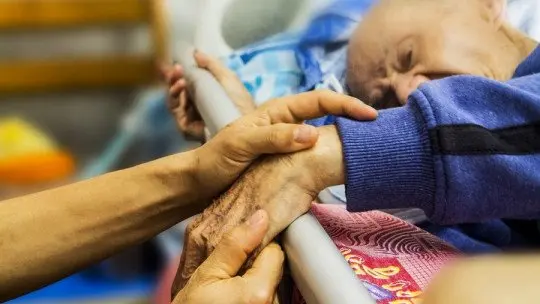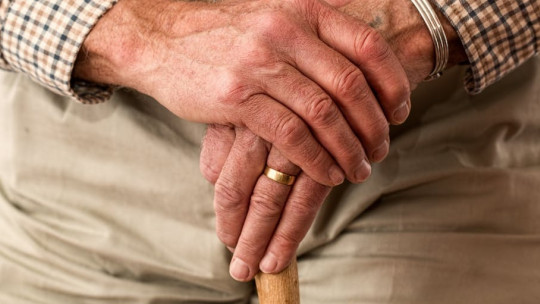Fulfilling the functions of a caregiver is not an easy task, especially when it comes to ensuring the well-being of a patient who has some type of dementia.
In this article you will find advice on how to help a person with dementia through a series of practical and useful tips that we can apply at home. The objective is to significantly reduce the level of wear and tear experienced by people who are dedicated to caring for patients with dementia.
What is dementia?
Before moving on to see how to help a person with dementia, it is important to know what this disease consists of and the type of limitations and consequences it implies on people’s lifestyle and their way of thinking, feeling and behaving.
Dementia is the gradual deterioration of the cognitive functions of the brain associated with abnormal development of the nervous system in old age or the late stages of adulthood, which involves complications of memory, thinking, and impulse regulation.
Depending on the level and type of dementia, the subject could present a total or partial loss of these cognitive functions, or even have intermittent episodes in which they have moments of lucidity interspersed with moments of memory loss or disconnection from reality.
Main types of dementia
There are several types of dementia, and depending on each of them the subject may present different symptoms. Let’s briefly see what the most common types of dementia are like, and what some of their main characteristics are.
1. Alzheimer’s dementia
This is the most common type of dementia, and is characterized by the fact that The number of neurons begins to gradually reduce, causing a loss of brain volume the first warning symptoms are memory loss and difficulty solving everyday problems.
2. Lewy body dementia
It represents approximately 10 to 15% of all cases, and It is characterized by small, abnormal deposits of a protein (alpha-synuclein) that generates interruption between neuronal connections (synapses). The main symptoms are; memory, language, and reasoning problems.
3. Vascular dementia
This type of dementia is the product of vascular complications. Specifically, occurs when blood flow to the brain is reduced , due to blockages in blood vessels. For example, during a stroke (CVA). Symptoms depend on the area of the brain where the damage occurs.
How to help a person with dementia?
In these lines we will see some effective ways to help someone with dementia, and promote their quality of life.
1. Maintain communication with the doctor
The main thing will be that we maintain a good communication channel with the doctor who is treating the person with dementia, and that we consult with them about any specific questions we may have regarding their conduct and care. It is important to remember that not all cases are the same.
2. Help the subject stay calm
Patients with dementia are often quite prone to losing their cool, due to confusion and memory loss. It is necessary that we understand their situation in an empathetic way, without letting ourselves be affected by the state of stress that they present, and help them stay calm.
3. Simplify routines
A fairly effective way to improve the quality of life and reduce frustration levels in people with some type of dementia is contribute to the simplification of your daily routines For example, daily cleaning, meals, etc. The idea is to look for new ways to do it, through which subjects feel less stressed.
It helps to have complete changes of clothes for each day, so that the person does not have to put too much effort into selecting their outfits. With regard to meals, it is useful to establish a relationship between each meal with something else (for example, a sound or melody), so that the person has a clear reference that it is time to eat.
4. Maintain a frequent dialogue
Dialogue with people helps keep your declarative memory active , especially if we talk to the subject about anecdotes in which he has participated. It is important that we maintain frequent communication with the person to avoid feelings of abandonment; We can set schedules for it.
5. Use memory games
There is a wide variety of these games, which contribute to reducing the intensity of cognitive deterioration in people with dementia Of course, the results depend on the degree of the subject’s condition, but they are always a good alternative to extend the quality of life of patients.
6. Have familiar objects nearby
Place familiar objects in the subject’s environment helps keep evoking memories , which is also useful to reduce cognitive wear. In addition, it helps reduce symptoms related to confusion.
7. Inform about current events
Helping the subject to be informed regarding current events is a way to keep them focused on the present and avoid being confused about the time in which you are
8. Regular walks
Accompanying therapeutic walks helps the person with dementia stay in touch with their surroundings, and contributes greatly to improving communication skills that are usually affected in people with this neurological disorder.
9. Music therapy
Music therapy sessions They relax and help stimulate patients’ cognitive processes , contributing significantly to your mental stability. When we are caring for a person with dementia, we should try to involve them in activities that help them stay calm.
10. Do not blame the person with dementia for their disinhibition
Disinhibition is one of the characteristics of dementia; Many of the people who have this type of illness have problems adjusting to social norms because of damage to the parts of your brain responsible for “counteracting” the influence of the limbic system It is important not to blame them for it, and understand that it is a phenomenon beyond their control.









